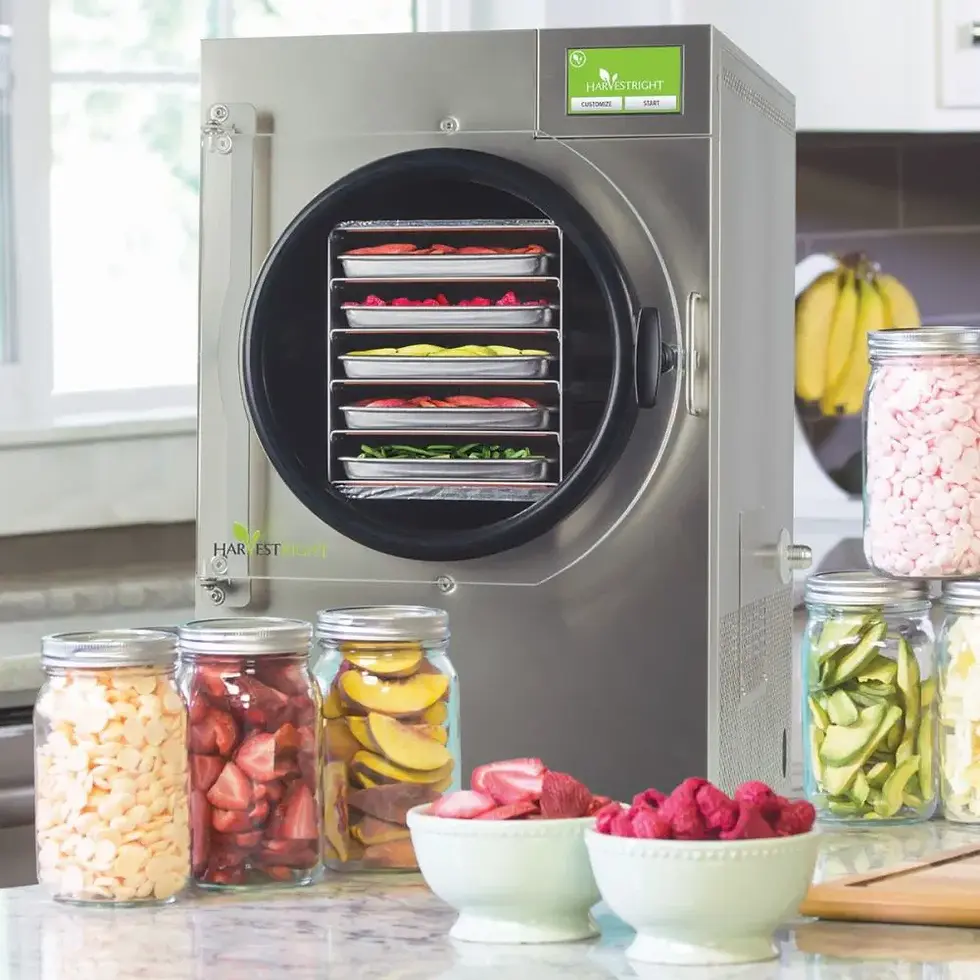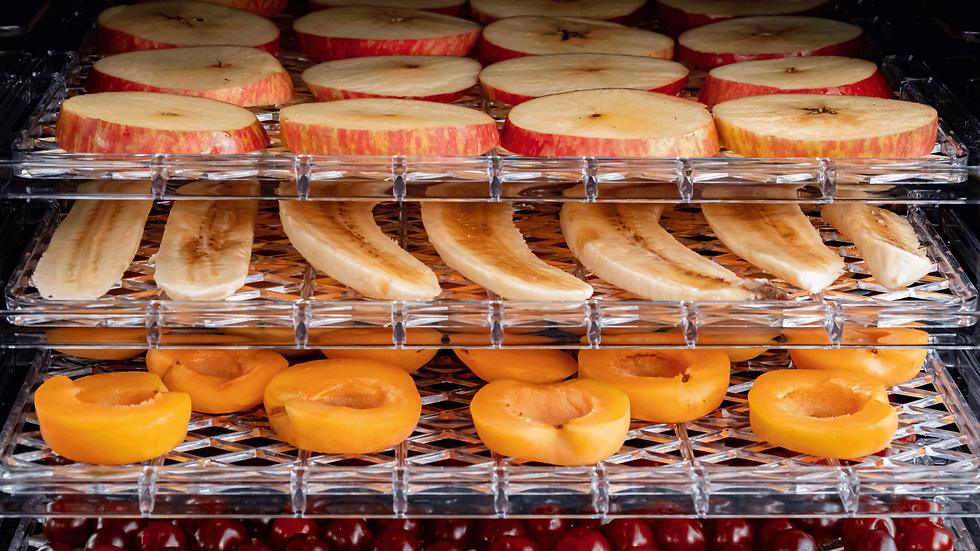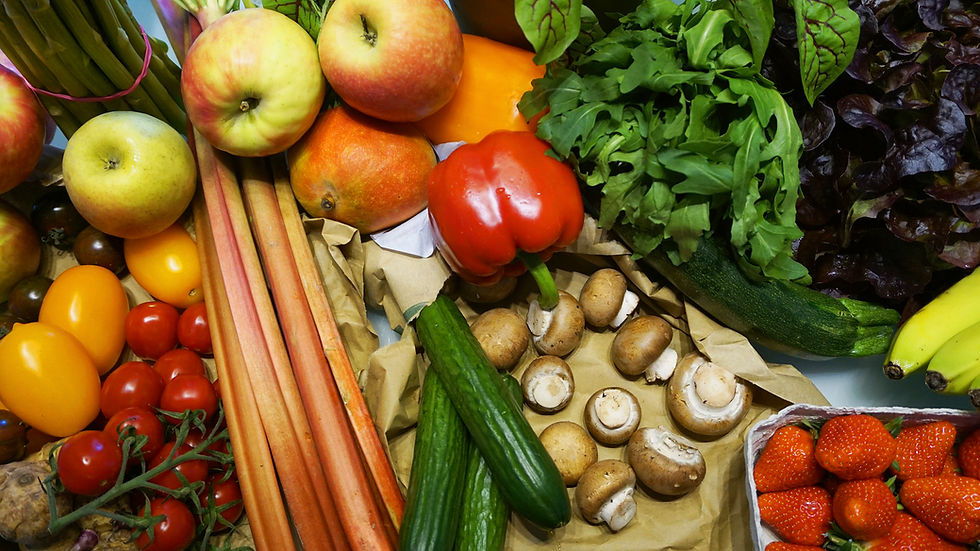Home Freeze Dryers Electricity Usage
- Walid
- Jul 29, 2025
- 9 min read
Understanding Home Freeze Dryer Energy Consumption
Understanding the electricity usage of home freeze dryers is crucial for managing both operational costs and energy efficiency. These machines, while incredibly effective for preserving food, do come with a notable energy demand that varies based on their size and design. The balance between using this method for food preservation and its energy consumption is essential for anyone considering investing in a freeze dryer.

Factors Affecting Electricity Usage
Several factors influence the electricity usage of home freeze dryers. Firstly, the capacity of the freeze dryer significantly impacts its power consumption. Larger models tend to require more electricity. Secondly, the ambient temperature also plays a role; units work harder in warmer environments, increasing their energy usage. Lastly, the duration of the freeze-drying cycle contributes to overall consumption, which can be extensive, especially for larger batches of food.
Energy Efficiency Ratings
When comparing different models, pay attention to their energy efficiency ratings. Look for information regarding their kilowatt-hour (kWh) consumption per cycle. This information helps you gauge their long-term operational costs. Below is a typical comparison of energy consumption across popular home freeze dryer models:
Model | Voltage | Average kWh per Cycle |
Model A | 120V | 1.5 kWh |
Model B | 120V | 2.0 kWh |
Model C | 240V | 2.5 kWh |
Conclusion
By understanding the factors and energy ratings associated with home freeze dryers, you can make informed decisions that align with your energy goals. Be sure to consider these aspects when investing in one of these machines for long-term food preservation.
This is just one of many great blogs we have—explore more right here.
Investing in a home freeze dryer can be a fantastic choice, but understanding its electricity usage is key to maximizing its benefits while minimizing costs.
How Much Electricity Does a Freeze Dryer Use?
Understanding the electricity usage of home freeze dryers is essential for anyone considering this food preservation method. Typically, home freeze dryers consume around 1 to 1.5 kWh per hour, depending on their size and efficiency. Knowing your home freeze dryer's electricity usage can help you gauge long-term energy costs and better manage your household budget. Most units operate for 24 hours, meaning energy costs can add up quickly.
Factors Affecting Energy Consumption
Several factors influence the electricity consumption of freeze dryers. These include the model's size, the amount of food being processed, and the specific freeze-drying cycle selected. Larger units generally use more power. Additionally, if you frequently use your freeze dryer for bulk processing, you'll notice a significant rise in energy bills.
Average Cost of Operation
To estimate the monthly cost, it’s crucial to calculate your home freeze dryer’s electricity usage over time. For example, running a freeze dryer for 24 hours may cost you between $3 and $5 daily. Let’s break down that cost:
Daily usage: 1.5 kWh x $0.12 = $0.18
Monthly usage: $0.18 x 30 days = $5.40
Yearly usage: $0.18 x 365 days = $65.70
With proper energy management and usage practices, these costs can be minimized.
Model | Daily Electricity Cost | Monthly Electricity Cost |
Small Unit | $3 | $90 |
Medium Unit | $4.50 | $135 |
Large Unit | $6 | $180 |
In conclusion, monitoring your home freeze dryer's electricity usage is vital for budgeting and efficiency. You can better manage operating costs by understanding how different factors affect energy consumption.
Choose energy-efficient models.
Monitor usage closely.
Consider time-of-use energy rates.
“Being aware of electrical consumption can significantly affect your decision-making when selecting a freeze dryer for your home.”
Factors Influencing Energy Use of Freeze Dryers
Understanding the key components that affect the Home Freeze Dryers Electricity Usage is essential for optimizing energy efficiency. Different factors contribute to how much electricity these appliances consume, which can vary widely based on usage and design. For anyone considering a home freeze dryer, it’s crucial to grasp these influences to manage costs and energy effectiveness.

Type of Food Being Dried
The type of food you choose to freeze dry significantly impacts the electricity consumption. Moisture content, density, and preparation method all play a role. Higher moisture foods typically require more energy to remove water, which translates to increased Home Freeze Dryers Electricity Usage. Understanding these nuances can help in selecting appropriate foods for freeze drying.
Operating Conditions
The conditions under which your freeze dryer operates also matter. Factors such as room temperature and humidity levels can exacerbate or alleviate energy consumption. A dryer placed in a climate-controlled space tends to use less power, thereby mitigating overall Electricity Usage costs.
Machine Size
Usage Frequency
Maintenance Levels
Regular maintenance ensures efficient operation, which reduces electricity costs over time. Neglecting upkeep can lead to higher energy bills.
Food Type | Energy Usage (kWh) |
Fruits | 2.5 |
Vegetables | 3.0 |
Meats | 4.0 |
Design and Technology
Another crucial factor contributing to Home Freeze Dryers Electricity Usage is the model's design and technology. Some freeze dryers incorporate energy-efficient features that significantly lower their power consumption. Researching the latest technologies can provide insights into making an informed purchase.
Insulation Quality
Control Systems
Heating Elements
"Investing in an energy-efficient home freeze dryer can save you money and make a positive impact on your environmental footprint."
Understanding Home Freeze Dryers’ Electricity Usage
As homeowners increasingly choose home freeze dryers for food preservation, understanding their electricity usage becomes vital. These appliances can significantly impact energy bills if their power needs are not thoroughly evaluated. Typically, home freeze dryers vary in electricity consumption based on size, model, and operational settings. To help you make an informed decision, comparing various units will provide insight into the long-term electricity expenses you may incur.

Comparing Home Freeze Dryers’ Power Needs
The power requirements of home freeze dryers can fluctuate widely between models. Smaller, portable units may use less electricity, whereas larger, commercial-grade models typically demand more power. To maximize efficiency while minimizing costs, assess the energy ratings and specifications of each device. It's essential to choose a model that fits both your food preservation needs and budget.
Want to explore more? Head over to our homepage and see what we have to offer!
Annual Electricity Costs
Understanding the annual electricity costs associated with home freeze dryers is crucial for budgeting. On average, you can expect to pay anywhere from $100 to $300 annually, depending on your usage. To assist with forecasting, you can analyze various factors, including the appliance's wattage and how frequently you operate it.
Model wattage
Usage frequency
Energy rates in your area
Model | Wattage | Estimated Annual Cost |
Small Unit | 600 W | $150 |
Medium Unit | 900 W | $200 |
Large Unit | 1200 W | $300 |
Final Thoughts
Knowledge of home freeze dryers electricity usage patterns is essential for effective planning. With informed decisions, homeowners can enjoy significant savings on energy bills while preserving food efficiently.
If you are looking for low energy consumption and high shelf life ingredients, dehydrated vegetable products are not to be missed.
Compare different models.
Analyze your electricity rates.
Calculate long-term savings.
"Investing wisely in a home freeze dryer can lead to substantial savings in both food and energy costs." - Expert Opinion
Tips to Reduce Home Freeze Dryers Electricity Usage
Home freeze dryers are excellent for preserving food, but their electricity usage can become a concern. By implementing a few simple strategies, you can significantly reduce your home freeze dryers electricity usage while still enjoying the benefits of your appliance. These tips are designed to help you maximize efficiency, save money and reduce your carbon footprint.

Optimize Operating Conditions
Choosing the right environment for your freeze dryer is crucial. Ensure your appliance is located in a well-ventilated area. Keeping it away from heat sources can minimize electricity usage as the machine won’t have to work as hard to maintain its temperature. Additionally, operating the machine during off-peak hours can further decrease your electricity bill.
Regular Maintenance Matters
Maintaining your freeze dryer will keep it functioning efficiently, ultimately lowering electricity usage. Clean the condenser regularly and check seals for damage. Proper maintenance ensures that your machine runs effectively, preserving the high-quality output you desire while consuming less energy.
Unclog and clean filters routinely.
Inspect seals and gaskets for wear.
Avoid overloading the dryer.
By following these guidelines, you can manage your home freeze dryers electricity usage effectively. Ready to start conserving energy? Here’s a handy table to summarize the tips:
Tip | Benefits |
Optimize operating conditions | Lower energy consumption and costs |
Regular maintenance | Improved efficiency |
Conclusion
Reducing your home freeze dryers electricity usage helps your wallet and the environment. Take action today to implement these strategies!
Investing in energy efficiency not only aids your budget, but also promotes sustainability.
If you want to add a rich mushroom flavor to your dishes, try ,
Evaluating Efficiency in Freeze Drying Appliances
When considering home freeze dryers, understanding their electricity usage is critical. Home freeze dryers can vary significantly in energy consumption based on their size and operational efficiency. By evaluating these appliances, you can ensure optimal use of energy while preserving food effectively. Maximizing your investment means being aware of how much electricity these devices draw and how that can impact your overall home energy costs.
Understanding Energy Ratings
When comparing home freeze dryers, pay attention to their energy efficiency ratings. These rates provide insight into the electricity usage of each model. A quality freeze dryer will combine performance with lower energy consumption, making it a sustainable choice for long-term use. It's essential to balance functionality and energy efficiency when assessing your options.
Potential Savings
Using energy-efficient freeze dryers can yield considerable savings in electricity costs over time. By minimizing electricity usage, households can enjoy longer-term benefits without compromising on quality. Here are some factors to consider while assessing savings: If you are looking for low energy consumption and high shelf life ingredients, dehydrated vegetable products are not to be missed.
Size of the unit
Operational time required
Energy efficiency rating
Based on these considerations, potential savings can be substantial, making the choice of a home freeze dryer crucial. If you want to add a rich mushroom flavor to your dishes, try , dehydrated porcini mushrooms which are full of flavor and easy to store.
Model | Energy Usage (kWh) | Efficiency Rating |
Model A | 1.2 | A+ |
Model B | 1.5 | A |
Making an Informed Choice
By considering energy usage, you can select a home freeze dryer that meets your needs without excessive costs. Doing your homework on electricity usage ensures that you're not just preserving food effectively, but also saving money on utility bills. For camping or outdoor travel, dehydrated spinach is lightweight and easy to carry without compromising on nutrition.
Check manufacturer specifications
Read customer reviews
Compare models
Investing in an energy-efficient home freeze dryer not only preserves food but can significantly reduce your electricity bills. Lightweight and efficient in emergency food storage or outdoor cooking,
Assessing the Long-Term Costs of Electricity Usage
When considering the addition of a home freeze dryer to your kitchen, it's essential to grasp the long-term costs associated with its electricity usage. Understanding how much energy your device consumes can significantly impact your household budget. Home freeze dryers can be an excellent investment for food preservation, but the associated electricity consumption must be factored into any financial calculations. Because they often operate for extended periods, evaluating the energy efficiency of these machines becomes crucial.
Examining Energy Consumption
Home freeze dryers typically require a substantial amount of energy, with estimates indicating they can use between 1.6 to 2.4 kWh per batch, depending on the model. If used regularly, this can accumulate to a notable monthly electricity cost. For homeowners prioritizing sustainability and cost-effectiveness, it is advisable to consider models that emphasize energy efficiency without sacrificing performance.
Cost Projections
Calculating the long-term costs of using home freeze dryers involves figuring out the average monthly electricity expenses. Below is a simplified breakdown of potential electricity costs:
Average electricity rate: $0.13 per kWh
Monthly usage estimate: 60 kWh
Projected monthly cost: $7.80
Usage Type | kWh per Month | Annual Cost |
Regular Use | 60 | $93.60 |
Occasional Use | 30 | $46.80 |
Making an Informed Decision
When selecting a home freeze dryer, it's essential to consider total electricity usage. This decision could impact your finances significantly. Evaluating energy ratings and operational efficiency can save you money in the long run.
Look for ENERGY STAR® certified models.
Research user reviews for practical efficiency tips.
Consider multi-functional appliances that may save energy.
Investing in energy-efficient appliances not only supports your budget but also contributes positively to the environment.
FAQs About Home Freeze Dryer Electricity Requirements
Are you considering investing in a home freeze dryer but are concerned about electricity usage? Understanding home freeze dryers' electricity usage can help you make informed decisions. These machines are designed to be energy efficient, yet their power requirements can vary significantly depending on the model and the amount of food being freeze-dried. Familiarizing yourself with these specifications is essential for both your energy bill and optimal performance.
What is the average wattage for home freeze dryers?
Typically, home freeze dryers consume between 600 to 1200 watts during operation. The wattage reflects how much electricity they use when drying food, and the amount of energy consumed can fluctuate based on several factors. The larger the unit, the higher its electricity usage may be, particularly during the initial freeze cycle.
Will using a freeze dryer increase my energy bill?
While home freeze dryers do consume electricity, their impact on your monthly energy bill is often manageable. Many users find that the overall increase in home freeze dryers' electricity usage is minimal when compared to the benefits of preserving food in bulk. However, energy-efficient models can further reduce operating costs.
Choose energy-efficient models.
Consider operating during off-peak hours.
Monitor power consumption to manage energy use.
Tips for Reducing Electricity Usage
To optimize home freeze dryers' electricity usage, consider investing in a unit with an excellent Energy Star rating. Regular maintenance, like cleaning the condenser, can ensure efficient performance, further trimming electricity costs.
Invest in Energy Star-rated units.
Perform routine maintenance for optimal efficiency.
By understanding and managing your home freeze dryers' electricity usage, you can maximize food preservation while minimizing energy costs!
Model | Wattage | Voltage |
Small Freeze Dryer | 600 W | 120 V |
Medium Freeze Dryer | 800 W | 120 V |
Large Freeze Dryer | 1200 W | 120 V |




Comments